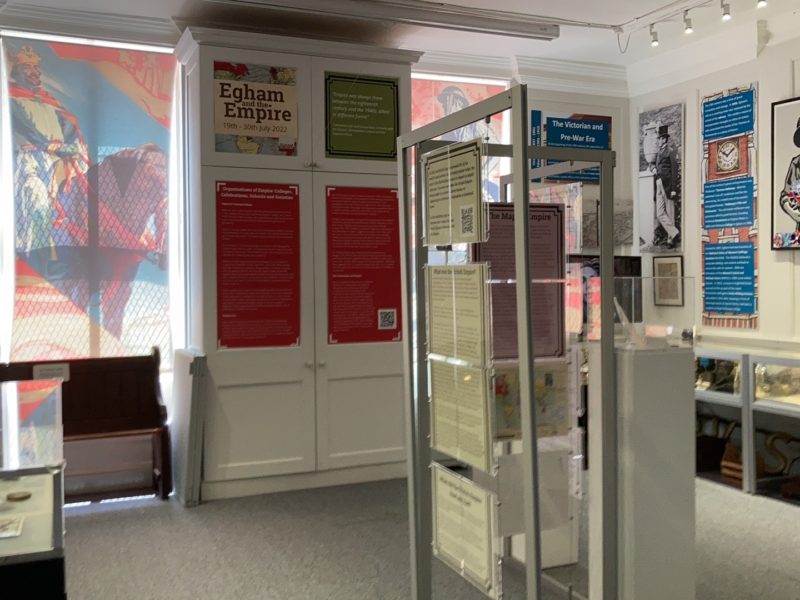Egham and the Empire: Introduction
One hundred years ago, the total land coverage of Britain’s imperial possessions covered 25% of the world’s land surface. But for many people today the topic of the British Empire and its impact is largely unknown, perhaps best remembered from a school history lesson, a television programme, or a historical novel. In recent years there has been a steadily increasing interest in the history of Britain’s imperial conquest, with an emphasis on both its impact and lasting legacy. It continues to be re-evaluated and re-assessed by both historians and the British public alike.
Until recently, historians thought that most people living in Britain during the nineteenth and twentieth centuries had little involvement with the empire and were largely unaware of what it meant to be part of (and in control of) one. This exhibition will address the ways in which our local community came into contact with the wider British Empire, mostly by examining imperial popular culture from the nineteenth and twentieth centuries. By this time, Britain was in control of many territories across the world.
What was the British Empire?
The British Empire is difficult to define, mainly because it meant different things to different people. Its meaning also changed and varied considerably over time. There were many people in Britain who took pride in it, yet for many others, particularly indigenous populations in the colonies, it represented both fear and control. The story of Britain’s Empire is not restricted to a national historical narrative but is also woven deeply into the global history of the world.
It is important to note that the British Empire did not simply ‘happen’, but instead was a result of several different factors. Empire building was one of the main concerns of European monarchs from the 1500s onwards, with many seeing a vast overseas empire as a demonstrative symbol of their own personal skill and power.
Many European powers simply took over land due to the presence of valuable natural resources, such as spices or precious metals. European Empires often fought for the control over particularly important territories – mainly ones where lucrative trade could happen. There was also the belief that the teachings of Christianity needed to be spread to people across the world, to supposedly ‘save’ or ‘civilise’ other peoples. These ideas all helped to create the imperialism that would be enacted by European powers for centuries.
For many members of the elite British classes, the empire was seen as a way of gaining a huge profit, often as a result of the exploitation of indigenous populations or through slave labour, most notably the involvement of slaves in sugar production and other ‘cash crops’ (such as tobacco). Many stately homes across Britain today are in some way linked to imperial trade, often due to the original owner’s economic interests. For example, wealth was acquired through cotton produced by slaves on plantations owned by members of the aristocracy. The middle-classes may have come into contact with the empire while acting in the capacity of merchants or beaurecrats. In the colonies the rigid class system of Britain was eschewed, which gave middle-class individuals the opportunity to gain real influence and power. The working-classes may have come into contact with the empire as soldiers, sailors, convicts or as settlers to these territories. In Britain, many working-class people were employed in factories that were involved in the production of goods that included imperial imports, like cotton.
Each imperial territory differed from others, with varying cultures, environments, and population sizes. The social, political, and environmental landscapes of these places were changed forever as a result of large numbers of settlers arriving from Britain to these territories, which often resulted in the displacement or destruction of indigenous peoples.
Some territories only ever had a small settler population: these were often colonial officials sent to ensure continuing British control. Large settler colonies, such as Canada and Australia, saw many people from Britain settle permanently, and were often regarded by the empire as superior to those that had small settler populations.
Of course, local peoples did not simply ‘allow’ Britain to gain control. The invading British forces were often met with local resistance by communities who refused to become a part of the empire and under British control. Resistance was always a possibility and continued even after the territory officially became a colonial possession. Resistance in various forms, either through violent conflict, protest or economic boycott was a constant occurrence throughout British imperial history.
When did the British Empire begin?
Historians continue to debate the exact starting point of the British Empire, but many conclude that British imperialism begun in the late 16th century with the attempts to settle North America.
From roughly 1500 onwards, monarchs from European nations started to conquer lands from across the globe. It was not unusual for different European nations to fight with each other over the rights to territories, particularly during the 1700s. The territories concerned often had the potential to be economically lucrative for these imperial powers, as they could generate enormous wealth. Territories were sometimes given or lost through treaties signed by European powers in order to end conflicts.
When did the British Empire end?
The end of empire is a tricky topic amongst historians. Arguably, the remnants of empire remain with us today. Many countries from the Commonwealth are seeking to become fully independent nations: the Commonwealth consists mostly of past colonies, some of which have been declared independent countries and have either remained in the Commonwealth or have broken away.
There are also issues of compensation and reparation from old European powers to past colonies, with many countries seeking apologies from those who once ruled over them. This is due to the violence, or exploitative systems such as slavery that negatively impacted local populations in the extreme.


